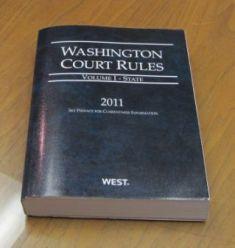What is a “frivolous” lawsuit? When people use the word “frivolous” in conversation, it usually means that something is inconsequential or not worth much consideration. But in a Washington courtroom, the word “frivolous” has a more specific meaning.
A “frivolous” lawsuit has been defined as “one that cannot be supported by any rational argument on the law or facts.” See Layne v. Hyde, 54 Wn. App. 125, 135 (1989). This definition goes hand in hand with Civil Rule 11, which requires a party and his or her attorney to conduct a “reasonable inquiry” to ensure that any document filed in court is supported by factual evidence and the law. Civil Rule 11 also prohibits a party from filing a document for any improper purpose, such as to harass, cause unnecessary delay, or cause a needless increase in the cost of litigation. 
Currently, if a “frivolous” lawsuit is filed, Washington state law allows judges to award attorneys fees and costs against the party that filed the frivolous lawsuit. RCW 4.84.185. A judge can also award monetary sanctions under Civil Rule 11 or even dismiss the lawsuit under Civil Rule 56.
But statistics show that “frivolous” lawsuits may be less of a problem than people believe. The National Center for State Courts reported that tort filings steadily dropped by 9 percent between 1992 and 2002. In California alone, the rate of filings dropped 45 percent. Assuming that at least some of the tort filings reviewed in this study were “frivolous,” then the numbers suggest that “frivolous” lawsuits are being filed less often.
The incentives for filing “frivolous” lawsuits may also be disappearing. According to a 2005 study published by the Bureau of Justice Statistics, the median damages awarded in general civil jury trials was only $28,000, down from $72,000 in 1992 (a decrease of 40 percent). In cases involving motor vehicle collisions, the drop was even greater: the 1992 median award of $41,000 dropped 60 percent to $17,000 in 2005. Almost two-thirds (62%) of all winning plaintiffs in 2005 were awarded $50,000 or less. Contrary to popular belief, only about 4% of plaintiffs were awarded $1 million or more.
So if there are already rules in place to keep frivolous lawsuits out of court, and if fewer lawsuits are being filed, and there are fewer incentives to file frivolous lawsuits, why do we still hear about them
Consider where stories about “frivolous” lawsuits come from, and who they benefit the most: big insurance companies for the most part, as well as other powerful corporate interests. The truth is that the fear of “frivolous” lawsuits is great for business.
Jurors who believe that “frivolous” lawsuits are a problem are less likely to award fair compensation for injuries suffered by accident victims. Juror by juror, case by case, insurance companies and big corporations get the benefit of the misinformation they spread. The less money they are required to pay on claims, the higher their profit margins.
And they are doing it at our expense. If we get to a point where citizens are so distrustful of what happens in courtrooms that they can’t give fair consideration to evidence that is presented, we will have lost our right to justice.